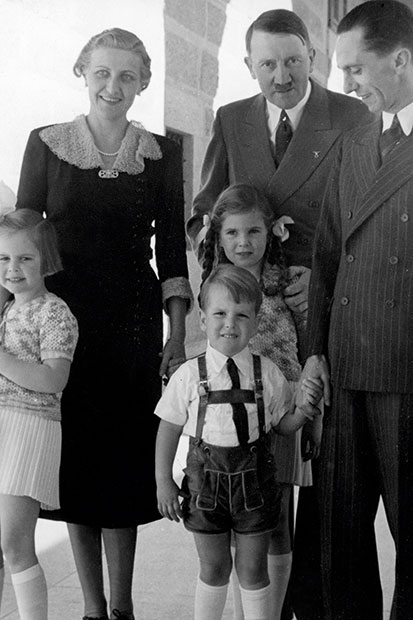It is ironic that this weighty biography of Hitler’s evil genius of a propaganda minister is published on the day of a general election filled with Joseph Goebbels’s hallmarks: mendacity, media manipulation and the big lie.
Seventy years after the spectacular suicide of Goebbels and his wife Magda, and their murder of their six children, in the Berlin bunker, the ‘little doctor’ is still a byword for the black arts of political spin and politicians regularly accuse each other of telling fibs ‘worthy of Goebbels’.
The Nazi specialist Peter Longerich, Professor of History at Royal Holloway, University of London, offers a compelling chronicle not because he writes with sparkle — German historians rarely do that and no fewer than three translators don’t help the plodding style — but because his book is based on Goebbels’s own caustic words. For, evil and twisted though he was, Goebbels is our most important eyewitness to the Nazi era from the early days of the party’s struggle for power to the final Götterdämmerung in burning Berlin. His daily diaries — filleted and analysed by Longerich — give us an intimate, candid and cynical inside view of the Third Reich from its second chief creator.
Longerich’s central thesis is psychological rather than political. Goebbels had a narcissistic personality disorder — call him the ‘Nasty Nazi Narcissist’ — causing him to identify Hitler as the one who could help him achieve his deep and dark desire for power and acclaim ahead of any considerations of morality.
His unswerving adoration of Hitler, rather than his marriage or his numerous affairs, was the leitmotif of his life. Indeed, Longerich reveals that there were three people in the Goebbels ménage: the couple themselves, and the Führer — who was a permanent guest in their home, doted on their children and chastely loved Magda.
Goebbels had a hard upbringing. The child of a poor but respectable Rhineland Catholic family, he was born with a club foot which gave him a permanent limp. This disability, coupled with high intelligence, driving ambition, voracious sexuality and relative poverty, provided a rich cocktail of bitter complexes and hang-ups as he started to write his revealing journals.
A wannabe writer, Goebbels gained a doctorate in literature. His youth was marked by a chronic shortage of money and a succession of tormented love affairs withvarious girlfriends. In the wake of the first world war, he became a fervent German nationalist and a vicious anti-Semite.
According to Longerich, the young Goebbels was always in search of a Messiah-like father figure to fulfil his nagging need for attention and applause. As a journalist he joined the rising Nazi party in the early 1920s. At first, he opposed Hitler as a Bavarian reactionary. Goebbels took the ‘socialist’ aspects of the Nazi programme seriously, and even called for Hitler’s expulsion from the party. But after actually meeting Hitler, and falling under his spell, his conversion was instant and complete. From that moment on he became a devoted disciple, and would not waver in his loyalty until they died together in the bunker as their Reich crashed in flames around them.
When Hitler was appointed German Chancellor in 1933, Goebbels was already on the inside track of Nazi power, and constantly at Hitler’s side. He remained minister for propaganda and public enlightenment until the very end.
No mean media manipulator himself, Hitler recognised the debt he owed to the little doctor who had carefully crafted his image and stage-managed his public appearances and who ran his elections with such original stunts as flying the Führer from rally to rally across Germany. (It was the first time a modern politician had taken to the air to conduct his campaign.)
Once in office, Goebbels used his unlimited power to create an empire beyond the dreams of his pale spin-doctor imitators today. He acquired total control of Germany’s press, publishing, broadcasting, theatre and film industries. He dictated the daily ‘line’ to be taken by a state-run media; he placed cheap radio sets in every home to ensure that everyone heard the message; and he commissioned the movies (and bedded the actresses) which sugared the Nazi propaganda pill.
The only time that the devoted disciple had a serious rift with his Führer (though he occasionally criticised Hitler in the privacy of his diaries) was when his affair with the beautiful Czech actress Lída Baarová caused Magda — unfaithful herself — to demand a divorce. Hitler intervened on Magda’s side, giving Goebbels the choice between giving up Baarová and losing his post. Reluctantly he obeyed. His mistress was expelled from Germany and the couple were (at least publicly) reconciled.
As the fortunes of war turned against Germany, Goebbels truly came into his own, demanding a fanatical commitment to ‘total war’, tirelessly touring bombed-out areas and issuing apocalyptic warnings about the consequences of German defeat. Alone of the top Nazi leaders, he remained with Hitler — faithful unto death to his idol and his love object.
Available from the Spectator Bookshop, £24 Tel: 08430 600033






Comments